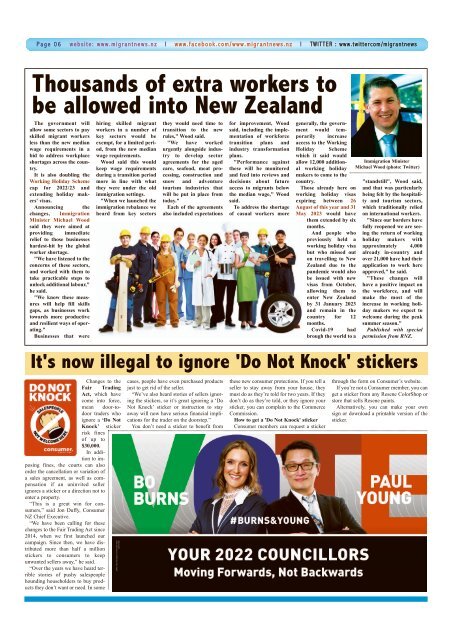You also want an ePaper? Increase the reach of your titles
YUMPU automatically turns print PDFs into web optimized ePapers that Google loves.
P a g e 0 6 w e b s i t e : w w w . m i g r a n t n e w s . n z I w w w . f a c e b o o k . c o m / w w w . m i g r a n t n e w s . n z I TWITTER : www.twittercom/migrantnews<br />
Thousands of extra workers to<br />
be allowed into New Zealand<br />
The government will<br />
allow some sectors to pay<br />
skilled migrant workers<br />
less than the new median<br />
wage requirements in a<br />
bid to address workplace<br />
shortages across the country.<br />
It is also doubling the<br />
Working Holiday Scheme<br />
cap for <strong>2022</strong>/23 and<br />
extending holiday makers'<br />
visas.<br />
Announcing the<br />
changes, Immigration<br />
Minister Michael Wood<br />
said they were aimed at<br />
providing immediate<br />
relief to those businesses<br />
hardest-hit by the global<br />
worker shortage.<br />
"We have listened to the<br />
concerns of these sectors,<br />
and worked with them to<br />
take practicable steps to<br />
unlock additional labour,"<br />
he said.<br />
"We know these measures<br />
will help fill skills<br />
gaps, as businesses work<br />
towards more productive<br />
and resilient ways of operating."<br />
Businesses that were<br />
hiring skilled migrant<br />
workers in a number of<br />
key sectors would be<br />
exempt, for a limited period,<br />
from the new median<br />
wage requirements.<br />
Wood said this would<br />
keep wage requirements<br />
during a transition period<br />
more in line with what<br />
they were under the old<br />
immigration settings.<br />
"When we launched the<br />
immigration rebalance we<br />
heard from key sectors<br />
they would need time to<br />
transition to the new<br />
rules," Wood said.<br />
"We have worked<br />
urgently alongside industry<br />
to develop sector<br />
agreements for the aged<br />
care, seafood, meat processing,<br />
construction and<br />
snow and adventure<br />
tourism industries that<br />
will be put in place from<br />
today."<br />
Each of the agreements<br />
also included expectations<br />
for improvement, Wood<br />
said, including the implementation<br />
of workforce<br />
transition plans and<br />
industry transformation<br />
plans.<br />
"Performance against<br />
these will be monitored<br />
and feed into reviews and<br />
decisions about future<br />
access to migrants below<br />
the median wage," Wood<br />
said.<br />
To address the shortage<br />
of casual workers more<br />
generally, the government<br />
would temporarily<br />
increase<br />
access to the Working<br />
Holiday Scheme<br />
which it said would<br />
allow 12,000 additional<br />
working holiday<br />
makers to come to the<br />
country.<br />
Those already here on<br />
working holiday visas<br />
expiring between 26<br />
August of this year and 31<br />
May 2023<br />
would have<br />
them extended by six<br />
months.<br />
And people who<br />
previously held a<br />
working holiday visa<br />
but who missed out<br />
on travelling to New<br />
Zealand due to the<br />
pandemic would also<br />
be issued with new<br />
visas from October,<br />
allowing them to<br />
enter New Zealand<br />
by 31 January 2023<br />
and remain in the<br />
country for 12<br />
months.<br />
Covid-19 had<br />
brough the world to a<br />
Immigration Minister<br />
Michael Wood (photo: Twitter)<br />
"standstill", Wood said,<br />
and that was particularly<br />
being felt by the hospitality<br />
and tourism sectors,<br />
which traditionally relied<br />
on international workers.<br />
"Since our borders have<br />
fully reopened we are seeing<br />
the return of working<br />
holiday makers with<br />
approximately 4,000<br />
already in-country and<br />
over 21,000 have had their<br />
application to work here<br />
approved," he said.<br />
"These changes will<br />
have a positive impact on<br />
the workforce, and will<br />
make the most of the<br />
increase in working holiday<br />
makers we expect to<br />
welcome during the peak<br />
summer season."<br />
Published with special<br />
permission from RNZ.<br />
It's now illegal to ignore 'Do <strong>No</strong>t Knock' stickers<br />
Changes to the<br />
Fair Trading<br />
Act, which have<br />
come into force,<br />
mean door-todoor<br />
traders who<br />
ignore a ‘Do <strong>No</strong>t<br />
Knock’ sticker<br />
risk fines<br />
of up to<br />
$30,000.<br />
In addition<br />
to imposing<br />
fines, the courts can also<br />
order the cancellation or variation of<br />
a sales agreement, as well as compensation<br />
if an uninvited seller<br />
ignores a sticker or a direction not to<br />
enter a property.<br />
“This is a great win for consumers,”<br />
said Jon Duffy, Consumer<br />
NZ Chief Executive.<br />
“We have been calling for these<br />
changes to the Fair Trading Act since<br />
2014, when we first launched our<br />
campaign. Since then, we have distributed<br />
more than half a million<br />
stickers to consumers to keep<br />
unwanted sellers away,” he said.<br />
“Over the years we have heard terrible<br />
stories of pushy salespeople<br />
hounding householders to buy products<br />
they don’t want or need. In some<br />
cases, people have even purchased products<br />
just to get rid of the seller.<br />
“We’ve also heard stories of sellers ignoring<br />
the stickers, so it’s great ignoring a ‘Do<br />
<strong>No</strong>t Knock’ sticker or instruction to stay<br />
away will now have serious financial implications<br />
for the trader on the doorstep.”<br />
You don’t need a sticker to benefit from<br />
these new consumer protections. If you tell a<br />
seller to stay away from your house, they<br />
must do as they’re told for two years. If they<br />
don’t do as they’re told, or they ignore your<br />
sticker, you can complain to the Commerce<br />
Commission.<br />
How to get a 'Do <strong>No</strong>t Knock' sticker<br />
Consumer members can request a sticker<br />
through the form on Consumer’s website.<br />
If you’re not a Consumer member, you can<br />
get a sticker from any Resene ColorShop or<br />
store that sells Resene paints.<br />
Alternatively, you can make your own<br />
sign or download a printable version of the<br />
sticker.

















